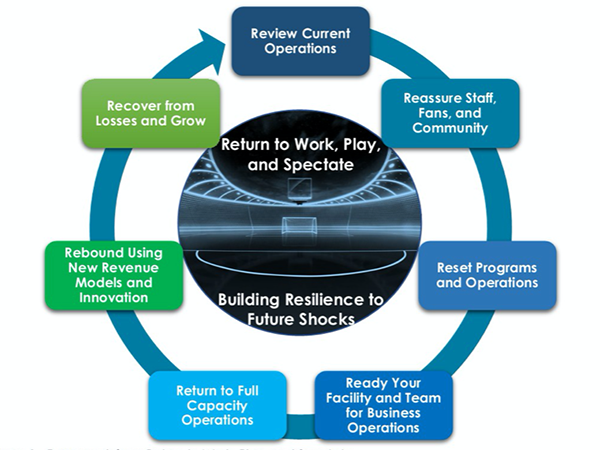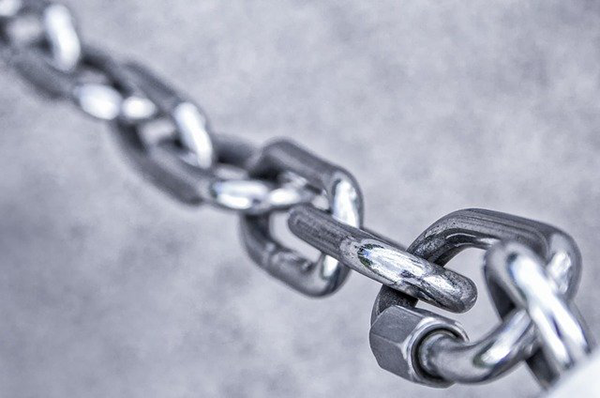Welcome to Dr. Lou’s View. I’m Dr. Lou Marciani, the director and co-founder of the Innovation Institute for Fan Experience. In this newsletter feature, I share my thoughts with our subscribers on a key issue facing the sports and entertainment industry. Today, we’ll discuss the impacts of the Delta variant on our industry. Our team has unlocked this post, as we aim to help as many people and organizations as possible in navigating this health crisis.
Where Things Stand with the Delta Variant
The U.S. is facing a surge in Covid infections unlike any since last fall and winter.
However, deaths have not reached the same level they did in previous peaks.
Hospitalizations have seen a sharper uptick than deaths, though.
Nonetheless, the rise of widespread vaccinations has helped blunt the blow caused by the Delta variant. New York Times data from states that report breakthrough infections underscores the degree to which vaccines help avoid severe outcomes. The numbers show that 95.3-99.9% of reported hospitalizations and 94.4-99.8% of reported deaths were among unvaccinated individuals.
In the Atlantic, Harvard-educated immunologist Dr. Katherine J. Wu outlines how this process works by likening the immune system to a castle. “Prepped by a vaccine, immune reinforcements will be marshaled to the fore much faster – within days of an invasion, sometimes much less,” she says.
Thus, we need to be adaptive as we face a stronger-than-before foe with a better-than-before tool – vaccination – at our disposal.
Part of that adaptivity includes understanding that while vaccines do not always prevent infections, they can give the immune system a head start to prevent severe illness, as Dr. Wu shares. I have also learned, however, that other health factors can impact the severity of and recovery from infection.
(At the time of this publication, I and our associate director, Chris Kinnan, are recovering from Covid infections. Chris and I have been fully vaccinated since April. We faced fairly mild cases, for which we credit vaccination and monoclonal antibody therapy. We encourage you to learn more about monoclonal antibody therapy here, find that treatment near you here, and find vaccinations near you here.)
How the Delta Variant is Affecting Live Events
Organizers of some prominent events like New Orleans’ Jazz Fest have canceled them. Other events, like Bonnaroo in central Tennessee are requiring proof of vaccination or a negative test for entry and recommending masks for unvaccinated patrons.
As NBC’s Tim Simmons outlines, Live Nation, the world’s largest concert provider, will also require proof of vaccination or a negative test to attend its concerts beginning October 4 where the law allows. Fellow industry leader AEG Presents announced a similar policy.
Staging Live Events
In our publication, Principles to Guide the Return to Work, Play, and Spectate, we outline steps for a safe return.

First, review current operations. Public health guidance has changed, so your event may face stricter requirements than before. Next, reassure staff, fans, and the community. Your constituents need to know you’re listening to them and want to keep them safe.
Then, ready your facility, business, and team operations plans. As we outline in this newsletter, policies on restrictions like mandatory vaccinations are evolving. New York City is soon requiring them, while other places have banned such requirements. Consult with medical professionals and government and health authorities on how to best protect your patrons in light of local, state, and national guidance.
After that, launch your event. Most major sporting events in the U.S. have returned to full capacity and seem to be staying there. However, not everyone – fans and staff alike – will be comfortable attending a full-capacity event right now.
Consider ways to connect with patrons, like the use of NFT (non-fungible token)-based virtual and real-life experiences. In this newsletter, we talk to NFT expert Aman Johar of Proteum Capital and QuikR about how to do just that.
Building that connection can make in-person events more meaningful to patrons who have been away for awhile and keep those still choosing to avoid larger events engaged. In doing those things, you can recover and rebound from pandemic-induced losses, even as you are still navigating Covid.
Assessing Other Difficulties
Our guide states, “Job losses at venues, sports and entertainment organizations, and throughout the supply chain will grow in 2021.”
In a recent newsletter, I outlined how the loss of event security jobs can exacerbate safety concerns. We are increasingly seeing supply chain disruptions elsewhere, too. Business Insider details how supply chain issues have affected some fast food giants.
In our guide’s section on partnerships, we note, “You are only as strong as the weakest link in the chain.”

So, determine what your weakest link is and how to address it. Food service, medical and security staff, and delivery and logistics are all dealing with supply chain strain. Accordingly, allow yourself extra time for planning, find creative ways to marshal resources, and plan for alternative solutions.
For instance, an event facing a shortage of trained gate security or stewards could enlist local retired law enforcement officers. (Be sure to vet such volunteers for competency and capability. Provide them with tools like personal protective equipment, training, and the presence of more experienced personnel, too.)
Be Flexible
Finally, be ready and willing to adapt. IIFX began with the goal of helping organizations adapt to a once-in-a-generation threat. We’re making strides, but, as the Delta variant reminds us, we have not yet eliminated this threat.
You’ve had to completely reimagine the structure of your sports and entertainment events over the past year-plus. What have you learned? What worked, and what would you do differently? How has your workforce changed, and how are you preparing them for the post-pandemic “new normal”?
Use the new skills you’ve learned and the real-life experiences you’ve had in this period of great change to help your organization through the latest phase of this threat.
And remember – we’re all adapting and changing right now. Your constituents and patrons don’t expect perfection. They want a connection with your organization.
So, show them you care. Be open about how you’re adapting to this current situation to protect their safety while giving them a meaningful and positive experience. Then, put those plans into action, and all the while, keep adapting, keep communicating, and keep connecting.
Thanks for reading,

Thank you for reading this free IIFX content. We are working to help our members create a Fancentric™ fan experience – a 360º journey that begins in the homes of spectators, staff, and talent. You can join us on that journey by subscribing. Also be sure to sign up for our biweekly newsletter, the IIFXtra, to get a mix of exclusive and unlocked content as soon as we publish it.
[mailmunch-form id=”1036259″]

